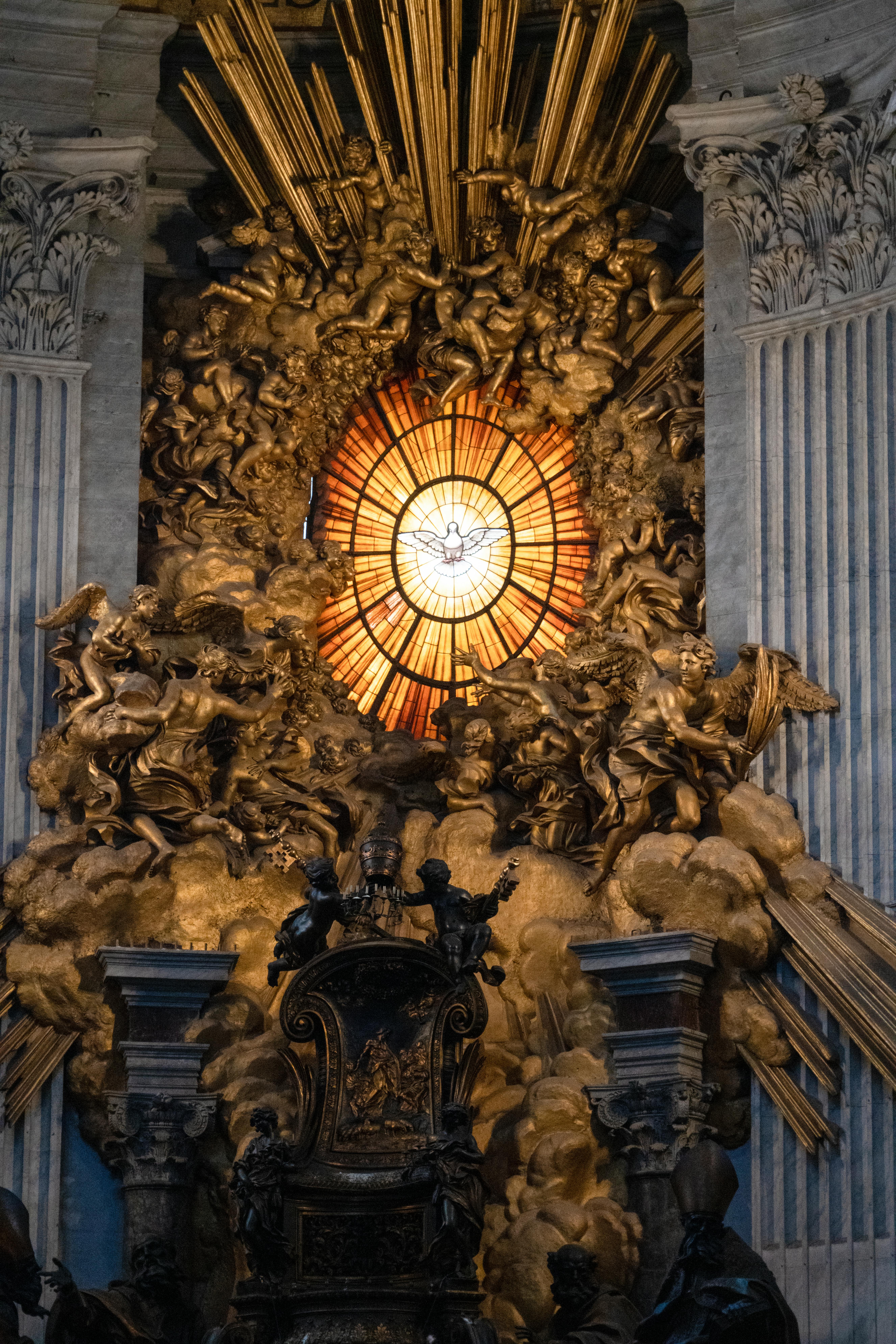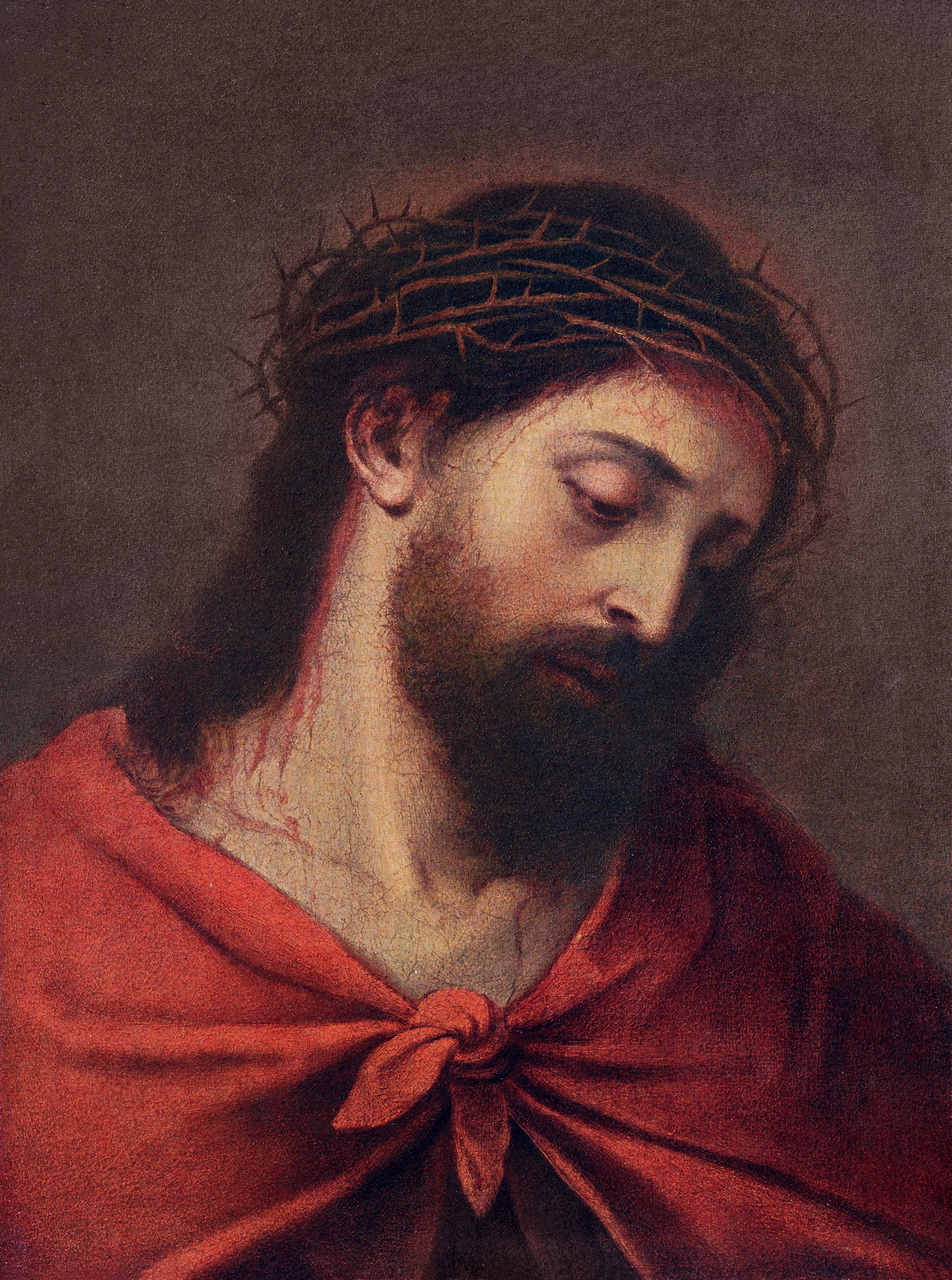[tts ignore]Click here for daily readings
[/tts]“Rely not on your wealth…. Say not: ‘Who can prevail against me?’” The first reading from Sirach is one of my favorites. Kind of sounds the opposite of the way people today think, doesn’t it?
I grew up being told that making a lot of money means you are successful. That was very much ingrained in my head. So, I started my adult life by trying to do just that. I fought my way through 19 people who were trying to get the same job, and I got it. It was for a large corporation with 35 branches around the country and I would be in one of them. It was without a doubt the most stressful job I have ever had! I was hired to be a purchasing agent.
Come Monday morning, I was told that I was to do that before 8:00am and after 5:00pm. Sitting before me was a four foot catalog that I knew nothing about. It was pieces and parts that had to do with hydraulics and pneumatics. I would be selling on the phone during the day to our customers. GULP! Learning and selling thousands of new parts and then ordering them and selling them on the phone in the early days was very stressful! I was bound not to fail.
I worked a lot of extra hours on salary to survive. This was a job totally run by negative motivation. I do not recommend that! However, after a year I was promoted to inside branch manager. It was still stressful because I was promoted too soon. Time moved on and I was still determined that I would make it. I worked very hard.
One day I came home earlier than usual. For some reason I came in the back door. I opened the door into the kitchen where my wife was doing dishes and our two little boys were standing near her. They both looked at me and had no idea who I was! They were about 3 and 1 years old at the time. They went and stood behind their mother as if they didn’t recognize me. I’m a lover of children and it broke my heart. I had been leaving the house before they got up and returning after they were in bed. At that moment I decided that climbing the corporate ladder was not as important as my family. So, I let go of my desire for success and backed off working so many hours.
Looking back 50 years, I believe it’s what the Lord really wanted me to do. He was calling me to not rely on wealth but on Him. I didn’t make as much money as I could have but we had enough to raise eight children with a stay at home mom. Now, with 31 grandchildren I am majorly blessed!
Serving with joy!
[tts ignore]Contact the author[/tts]
“No confíes en tus riquezas… No digas: ‘Yo a nadie me someto’”. La primera lectura de Sirácides es una de mis favoritas. Suena un poco al contrario de lo que la gente piensa hoy día, ¿no crees?
Crecí escuchando que ganar mucho dinero significa que eres exitoso. Eso estaba muy arraigado en mi cabeza. Entonces, comencé mi vida adulta tratando de hacer exactamente eso. Me abrí paso entre 19 personas que intentaban obtener el mismo trabajo, y yo lo conseguí. Era para una gran corporación con 35 sucursales en todo el país y yo estaría en una de ellas. ¡Fue sin duda el trabajo más estresante que he tenido! Me contrataron para ser agente de compras.
El lunes por la mañana, me dijeron que debía hacer eso antes de las 8:00 a. m. y después de las 5:00 p. m. Frente a mí había un catálogo de cuatro pies del que no sabía nada. Eran piezas y partes que tenían que ver con hidráulica y neumática. Durante el día, yo vendía por teléfono a nuestros clientes. ¡Aprender y vender miles de piezas nuevas y luego pedirlas y venderlas por teléfono en los primeros días fue muy estresante! Estaba resuelto a no fracasar.
Trabajé muchas horas extras por salario para sobrevivir. Este era un trabajo totalmente dirigido por una motivación negativa. ¡No lo recomiendo! Sin embargo, después de un año me ascendieron a gerente interno de la sucursal. Todavía era estresante porque me ascendieron demasiado pronto. El tiempo pasó y yo seguía decidido a lograrlo. Trabajé muy duro.
Un día llegué a casa antes de la hora normal. Por alguna razón entré por la puerta trasera. Abrí la puerta de la cocina donde mi esposa estaba lavando los platos y nuestros dos niños pequeños estaban de pie cerca de ella. ¡Ambos me miraron y no tenían idea de quién era yo! Tenían alrededor de 3 y 1 año en ese momento. Fueron y se pararon detrás de su madre como si no me reconocieran. A mi me encantan los niños pequeños y eso me rompió el corazón. Había estado saliendo de la casa antes de que se levantaran y regresando después de que se acostaron. En ese momento decidí que ascender en la empresa no era tan importante como mi familia. Así que dejé de lado mi deseo de éxito y dejé de trabajar tantas horas.
Mirando hacia atrás 50 años, creo que es lo que el Señor realmente quería que hiciera. Me estaba llamando a no depender de la riqueza sino de Él. No gané tanto dinero como podría haber hecho, pero teníamos lo suficiente para criar a ocho hijos con una madre que se quedaba en casa. ¡Ahora, con 31 nietos, soy un hombre muy bendecido!
¡Sirviendo con alegría!
[tts ignore]Comunicarse con el autor
 [/tts]Deacon Dan Schneider is a retired general manager of industrial distributors. He and his wife Vicki have been married for over 55 years. They are the parents of eight children and thirty-one grandchildren. He has a degree in Family Life Education from Spring Arbor University. He was ordained a Permanent Deacon in 2002. He has a passion for working with engaged and married couples and his main ministry has been preparing couples for marriage.[tts ignore]
[/tts]Deacon Dan Schneider is a retired general manager of industrial distributors. He and his wife Vicki have been married for over 55 years. They are the parents of eight children and thirty-one grandchildren. He has a degree in Family Life Education from Spring Arbor University. He was ordained a Permanent Deacon in 2002. He has a passion for working with engaged and married couples and his main ministry has been preparing couples for marriage.[tts ignore]
Featured Image Credit: Katie Harp, unsplash.com/photos/10-us-dollar-bill-and-coins-T4mMxYS31z0
[/tts]The views and opinions expressed in the Inspiration Daily blog are solely those of the original authors and contributors. These views and opinions do not necessarily represent those of Diocesan, the Diocesan staff, or other contributors to this blog.


 Elizabeth Tomlin is the author of Joyful Momentum: Building and Sustaining Vibrant Women’s Groups and contributing author to the Ave Prayer Book for Catholic Mothers. She is General Counsel for the Archdiocese for the Military Services, USA. Elizabeth is an Army wife and mother of three and currently lives in Oklahoma. You can find her at @elizabethannetomlin on social media and she blogs at
Elizabeth Tomlin is the author of Joyful Momentum: Building and Sustaining Vibrant Women’s Groups and contributing author to the Ave Prayer Book for Catholic Mothers. She is General Counsel for the Archdiocese for the Military Services, USA. Elizabeth is an Army wife and mother of three and currently lives in Oklahoma. You can find her at @elizabethannetomlin on social media and she blogs at 
 Dr. Alexis Dallara-Marsh is a board-certified neurologist who practices in Bergen County, NJ. She is a wife to her best friend, Akeem, and a mother of four little ones on Earth and two others in heaven above.
Dr. Alexis Dallara-Marsh is a board-certified neurologist who practices in Bergen County, NJ. She is a wife to her best friend, Akeem, and a mother of four little ones on Earth and two others in heaven above.
 Tami Urcia is a midwestern gal from a large Catholic family. As a young adulthood she was a missionary in Mexico, where she studied theology and philosophy. After returning stateside bilingual, she gained a variety of work experience, traveled extensively and finished her Bachelor’s Degree at Brescia University. She loves organizing and simplifying things, watching her children play sports, deep conversations with close family and friends and finding unique ways to brighten others’ day with Christ’s love. She works full time at Diocesan in the Software Department and manages the Inspiration Daily reflections. She is also a guest blogger on
Tami Urcia is a midwestern gal from a large Catholic family. As a young adulthood she was a missionary in Mexico, where she studied theology and philosophy. After returning stateside bilingual, she gained a variety of work experience, traveled extensively and finished her Bachelor’s Degree at Brescia University. She loves organizing and simplifying things, watching her children play sports, deep conversations with close family and friends and finding unique ways to brighten others’ day with Christ’s love. She works full time at Diocesan in the Software Department and manages the Inspiration Daily reflections. She is also a guest blogger on 
 Pamela Kavanaugh is a grateful wife, mother, and grandmother who has dedicated her professional life to Catholic education. Though she has done her very best to teach her students well in the subjects of language and religion, she knows that she has learned more than she has taught. She lives, teaches, and writes in southwest suburban Chicago.
Pamela Kavanaugh is a grateful wife, mother, and grandmother who has dedicated her professional life to Catholic education. Though she has done her very best to teach her students well in the subjects of language and religion, she knows that she has learned more than she has taught. She lives, teaches, and writes in southwest suburban Chicago.
 Kathryn Mulderink, MA, is married to Robert, Station Manager for Holy Family Radio. Together they have seven children (including Father Rob), and eleven grandchildren. She is President of the local community of Secular Discalced Carmelites and has published five books and many articles. Over the last 30 years, she has worked as a teacher, headmistress, catechist, Pastoral Associate, and DRE, and as a writer and voice talent for Catholic Radio. Currently, she serves the Church by writing and speaking, and by collaborating with various parishes and to lead others to encounter Christ and engage their faith. Her website is
Kathryn Mulderink, MA, is married to Robert, Station Manager for Holy Family Radio. Together they have seven children (including Father Rob), and eleven grandchildren. She is President of the local community of Secular Discalced Carmelites and has published five books and many articles. Over the last 30 years, she has worked as a teacher, headmistress, catechist, Pastoral Associate, and DRE, and as a writer and voice talent for Catholic Radio. Currently, she serves the Church by writing and speaking, and by collaborating with various parishes and to lead others to encounter Christ and engage their faith. Her website is 
 Merridith Frediani loves words and is delighted by good sentences. She also loves Lake Michigan, dahlias, the first sip of hot coffee in the morning, millennials, and playing Sheepshead with her husband and three kids. She writes for Catholic Mom, Diocesan.com, and her local Catholic Herald. Her first book Draw Close to Jesus: A Woman’s Guide to Adoration is available at Our Sunday Visitor and Amazon. You can learn more at
Merridith Frediani loves words and is delighted by good sentences. She also loves Lake Michigan, dahlias, the first sip of hot coffee in the morning, millennials, and playing Sheepshead with her husband and three kids. She writes for Catholic Mom, Diocesan.com, and her local Catholic Herald. Her first book Draw Close to Jesus: A Woman’s Guide to Adoration is available at Our Sunday Visitor and Amazon. You can learn more at 
 Kate Taliaferro is an Air Force wife and mother. She is blessed to be able to homeschool, bake bread and fold endless piles of laundry. When not planning a school day, writing a blog post or cooking pasta, Kate can be found curled up with a book or working with some kind of fiber craft. Kate blogs at
Kate Taliaferro is an Air Force wife and mother. She is blessed to be able to homeschool, bake bread and fold endless piles of laundry. When not planning a school day, writing a blog post or cooking pasta, Kate can be found curled up with a book or working with some kind of fiber craft. Kate blogs at 
 Ben Hooper is originally from Maryland, having been adopted from Korea and growing up in the Catholic faith. He went to Franciscan University to dive deeper into his faith and eventually graduated with a degree in Business Management. He loves musical theater, sports, spending time with his fiancé Lily and their dog Kolbe.
Ben Hooper is originally from Maryland, having been adopted from Korea and growing up in the Catholic faith. He went to Franciscan University to dive deeper into his faith and eventually graduated with a degree in Business Management. He loves musical theater, sports, spending time with his fiancé Lily and their dog Kolbe.
 Mike Karpus is a regular guy. He grew up in Michigan’s Upper Peninsula, graduated from Michigan State University and works as an editor. He is married to a Catholic school principal, raised two daughters who became Catholic school teachers at points in their careers, and now relishes his two grandchildren, including the older one who is fascinated with learning about his faith. He also has served on a Catholic school board, a pastoral council and a parish stewardship committee. He currently is a lector at Mass, a Knight of Columbus, Adult Faith Formation Committee member and a board member of the local Habitat for Humanity organization. But mostly he’s a regular guy.
Mike Karpus is a regular guy. He grew up in Michigan’s Upper Peninsula, graduated from Michigan State University and works as an editor. He is married to a Catholic school principal, raised two daughters who became Catholic school teachers at points in their careers, and now relishes his two grandchildren, including the older one who is fascinated with learning about his faith. He also has served on a Catholic school board, a pastoral council and a parish stewardship committee. He currently is a lector at Mass, a Knight of Columbus, Adult Faith Formation Committee member and a board member of the local Habitat for Humanity organization. But mostly he’s a regular guy.
 Hailing from Nashville, Catherine is a graduate of Christendom College with a lifelong passion for words. Her love of writing and her Catholic Faith continue to shape her as a freelance editor, copywriter, and (aspiring) novelist, where she pursues her passions for the love and greater glory of God.
Hailing from Nashville, Catherine is a graduate of Christendom College with a lifelong passion for words. Her love of writing and her Catholic Faith continue to shape her as a freelance editor, copywriter, and (aspiring) novelist, where she pursues her passions for the love and greater glory of God.
 Colleen Orchanian is a podcaster, blogger, and spiritual director who desires to help others have a more profound encounter with God. She is the author of three books: Nearer My God to Thee, Times of Grace, and Lingering with God. Her podcast is Food for Thought (Spiritually Speaking). You can learn more at
Colleen Orchanian is a podcaster, blogger, and spiritual director who desires to help others have a more profound encounter with God. She is the author of three books: Nearer My God to Thee, Times of Grace, and Lingering with God. Her podcast is Food for Thought (Spiritually Speaking). You can learn more at 